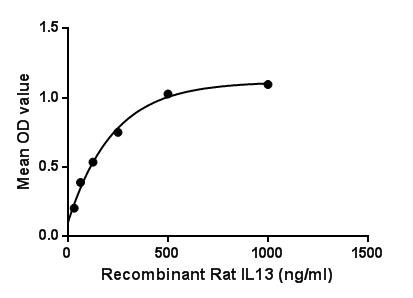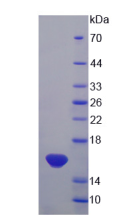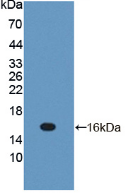
Details
ACTIVITY TEST
Buffer Formulation 100mMNaHCO3, 500mMNaCl, pH8.3, containing 1mM EDTA, 1mM DTT, 0.01% SKL, 5% Trehalose and Proclin300. Traits Freeze-dried powder Purity > 80% Isoelectric Point 8.6 Applications Cell culture; Activity Assays.

Figure. The binding activity of IL13 with IL13Ra1.
Interleukin 13 (IL13) is cytokine secreted by many cell types, but especially T helper type 2 (Th2) cells. IL13 has effects on immune cells that are similar to those of the closely related cytokine IL4. Although IL13 is associated primarily with the induction of airway disease, it also has anti-inflammatory properties. IL13 induces a class of protein-degrading enzymes, known as matrix metalloproteinases (MMPs), in the airways. Furthermore, IL-13 can induce immunoglobulin E (IgE) secretion from activated human B cells. Besides, Interleukin 13 Receptor Alpha 1 (IL13Ra1) has been identified as an interactor of IL13, thus a binding ELISA assay was conducted to detect the interaction of recombinant rat IL13 and recombinant rat IL13Ra1. Briefly, IL13 were diluted serially in PBS, with 0.01% BSA (pH 7.4). Duplicate samples of 100uL were then transferred to IL13Ra1-coated microtiter wells and incubated for 2h at 37℃. Wells were washed with PBST and incubated for 1h with anti-IL13 pAb, then aspirated and washed 3 times. After incubation with HRP labelled secondary antibody, wells were aspirated and washed 3 times. With the addition of substrate solution, wells were incubated 15-25 minutes at 37℃. Finally, add 50µL stop solution to the wells and read at 450nm immediately. The binding activity of IL13 and IL13Ra1 was shown in Figure 1, and this effect was in a dose dependent manner.USAGE
Reconstitute in 100mM NaHCO3, 500mM NaCl (pH8.3) to a concentration of 0.1-1.0 mg/mL. Do not vortex.
STORAGE
Avoid repeated freeze/thaw cycles. Store at 2-8°C for one month. Aliquot and store at -80°C for 12 months.
STABILITY
The thermal stability is described by the loss rate. The loss rate was determined by accelerated thermal degradation test, that is, incubate the protein at 37°C for 48h, and no obvious degradation and precipitation were observed. The loss rate is less than 5% within the expiration date under appropriate storage condition.
Image

Figure. SDS-PAGE

Figure. Western Blot
Partial purchase records(bought amounts latest0)
User Comment(Total0User Comment Num)
- No comment


 +86 571 56623320
+86 571 56623320




